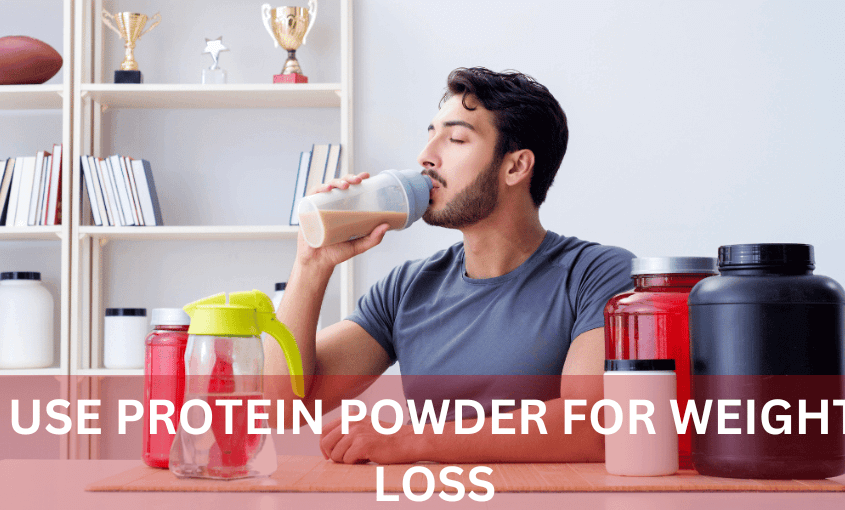How to Use Protein Powder for Weight Loss: A Complete Guide

Are you looking to shed those extra pounds and embark on a healthier lifestyle? If so, incorporating protein powder into your diet might be the key to achieving your weight loss goals.
Protein powder is a versatile and convenient supplement that can provide your body with the essential nutrients it needs while aiding in your weight loss journey.
In this guide, we will explore the benefits of protein powder for weight loss, the different types of protein powders available, and how to use protein powder for weight loss in your diet.
Whether you’re a fitness enthusiast or a beginner on the path to a healthier lifestyle, this guide will provide you with the necessary knowledge and practical tips on utilizing protein powder for successful weight loss.
So, let’s get started and unlock the power of protein powder in your weight loss journey!
Understanding The Role of Protein Powder
In your quest for weight loss, protein powder can be a game-changer. It not only provides a convenient and versatile way to increase your protein intake but also offers numerous benefits for your weight loss journey.
Whether you’re a fitness enthusiast, a busy professional, or someone trying to shed a few extra pounds, incorporating protein powder into your diet can help you achieve your goals more effectively.
Protein powder is a widely used dietary supplement that can be helpful for weight loss when used in conjunction with a balanced diet and regular exercise.
It is typically made from protein sources such as whey, casein, soy, or plant-based protein.
One of the key reasons why protein powder is considered beneficial for weight loss is its ability to increase feelings of fullness or satiety.
Protein takes longer to digest compared to carbohydrates and fats, so consuming protein powder can help curb hunger and reduce overall calorie intake.
Protein is also essential for muscle growth and repair. When combined with exercise, protein powder can help maintain or increase muscle mass while losing weight.
This is important because muscle is more metabolically active than fat, meaning it burns more calories even at rest. By preserving or building muscle, protein powder can contribute to a higher metabolic rate, thus aiding in weight loss efforts.
Additionally, protein powder is often low in calories, fat, and carbohydrates, which makes it a convenient option for calorie control.
It allows individuals to consume a high-protein, low-calorie meal or snack that can help them feel satisfied without consuming excessive calories.
However, it’s important to note that protein powder is not a magic solution for weight loss on its own.
It should be used as part of an healthy eating plan and combined with regular physical activity.
Types of Protein Powder for Weight Loss
There are several types of protein powder available, each offering different benefits. Here are some common types of protein powder that can be beneficial for weight loss:
- Whey Protein: Whey protein is one of the most popular types of protein powder. It is rapidly absorbed by the body, making it an excellent choice for post-workout recovery. Whey protein also contains essential amino acids, which promote muscle growth and repair. It is derived from milk, so it may not be suitable for those who are lactose intolerant.
- Casein Protein: Casein protein is another type of protein derived from milk. Unlike whey protein, casein is digested more slowly, providing a sustained release of amino acids. This can help to keep you feeling full for longer. Casein protein is often recommended as a bedtime snack to support muscle recovery during sleep.
- Soy Protein: Soy protein is derived from soybeans and is a suitable option for vegetarians or people with lactose intolerance. It is a complete protein, meaning it contains all essential amino acids. Soy protein is also rich in antioxidants and phytoestrogens, which may have additional health benefits.
- Plant-Based Protein: Plant-based protein powders are derived from sources such as peas, brown rice, hemp, or a combination of plant proteins. They can provide a suitable alternative for those following a vegan or vegetarian diet. Plant-based protein powders generally have fiber content, which can aid in satiety and digestive health.
- Egg Protein: Egg protein powder is made from egg whites and is a complete protein source. It is low in carbohydrates and fat, making it a good option for weight loss. Egg protein powder is also suitable for people with lactose intolerance or those who choose to avoid dairy.
Determining Protein Requirements
Determining protein requirements can vary depending on factors such as age, sex, weight, activity level, and overall health goals. Here are some general guidelines to help determine protein requirements:
Recommended Daily Allowance (RDA)
The RDA for protein is set at 0.8 grams of protein per kilogram of body weight (or about 0.36 grams per pound).
This is the minimum amount of protein needed to meet basic nutritional requirements and prevent deficiency.
However, the RDA may not be sufficient for individuals with specific health goals, such as weight loss or muscle gain.
Activity Level
People who are physically active or participate in regular exercise may require higher protein intake to support muscle recovery and growth.
Depending on the intensity and frequency of your workouts, protein requirements can range from 1.2 to 2.2 grams of protein per kilogram of body weight (or 0.5 to 1 gram per pound).
Weight Loss
Protein can help with weight loss by increasing feelings of fullness and preserving muscle mass. Consuming 1.2 to 2 grams of protein per kilogram of body weight (or around 0.5 to 0.9 grams per pound) is generally recommended for individuals on a weight loss journey.
Muscle Gain
If your goal is to build muscle, protein requirements are typically higher. It is commonly suggested to consume 1.4 to 2.2 grams of protein per kilogram of body weight (or around 0.6 to 1 gram per pound) for muscle gain.
Individual Considerations
Certain factors, such as age, sex, and health conditions, can influence protein requirements.
Older individuals may have slightly higher protein needs to support muscle maintenance.
Pregnant or breastfeeding women may require additional protein to support fetal development or milk production.
Individuals with specific health conditions or medical needs should consult with a healthcare professional or registered dietitian for personalized recommendations.
How to Use Protein Powder for Weight Loss
Using protein powder for weight loss can be a helpful strategy when incorporated into a well-balanced diet and exercise plan. Here are some tips on how to use protein powder effectively for weight loss:
Choose a High-Quality Protein Powder
Look for a protein powder that is low in added sugars, artificial additives, and unnecessary fillers.
Opt for a product that contains high-quality protein sources such as whey, casein, soy, or plant-based proteins.
Determine Protein Requirements
Calculate your protein requirements based on your weight, activity level, and weight loss goals.
Aim for a protein intake within the recommended range for weight loss (1.2 to 2 grams per kilogram of body weight, or 0.5 to 0.9 grams per pound).
Use Protein Powder as a Meal or Snack Replacement
Replace a meal or snack with a protein shake made using your protein powder. This can help control calorie intake and provide a nutritious, high-protein option.
Consider adding fruits, vegetables, or healthy fats to make the shake more filling and nutritious.
Time Protein Intake Around Workouts
Consuming protein powder around your workouts can support muscle recovery and growth.
Consider having a protein shake 30 minutes to an hour before or after a workout to maximize its benefits.
Mix Protein Powder with Other Foods
Protein powder can be integrated into various recipes to increase protein content.
Add it to smoothies, yogurt, oatmeal, or baked goods for a protein boost. This can help increase satiety and make your meals more filling.
Tips for Using Protein Powder
Protein powder can be a helpful tool when it comes to weight loss, as it provides a convenient source of protein that can help you feel fuller and support muscle growth.
Here are some tips for using protein powder effectively to achieve your weight loss goals:
- Choose the right type of protein powder: There are various types of protein powder available, such as whey, casein, soy, and plant-based options like pea or hemp protein. Consider your dietary restrictions, preferences, and goals when selecting a protein powder.
- Opt for a high-quality protein powder: Look for a product that is low in added sugars and artificial additives. You want a protein powder that is primarily made from protein sources rather than fillers.
- Determine your protein needs: Calculate your daily protein needs based on your weight, age, activity level, and goals. Generally, a good rule of thumb for weight loss is to consume 0.8-1 gram of protein per pound of body weight.
- Use protein powder as a meal replacement: Replace one or two meals per day with a protein shake containing your preferred protein powder. This can help reduce your overall calorie intake while ensuring you meet your protein requirements.
- Include protein powder in your recipes: Protein powder can be a versatile ingredient and can be used in various recipes, such as smoothies, pancakes, protein bars, or energy balls. This allows you to incorporate protein into your diet without relying solely on shakes.
- Watch your portion sizes: Pay attention to the serving size and make sure you’re not consuming more calories than intended. While protein powder can be beneficial for weight loss, consuming too much can still contribute to weight gain.
- Stay hydrated: Drinking enough water is important, especially when consuming protein powder. Water helps with digestion, nutrient absorption, and overall bodily functions.
Conclusion
Protein powder can be a valuable tool for individuals looking to achieve their weight loss goals.
However, it’s important to remember that protein powder is not a magic solution; it should be used in conjunction with a healthy lifestyle and personalized nutritional plan. Incorporating protein powder into your weight loss journey can be a game-changer.
Protein powder provides a convenient and effective way to boost your protein intake, which can aid in appetite control, promote lean muscle growth, and support overall metabolism.
Remember to choose a high-quality protein powder that suits your dietary preferences and goals and learn how to use protein powder for weight loss.
Additionally, consult with a healthcare professional or registered dietitian to ensure you are using protein powder correctly and in accordance with your personal needs.
With dedication, consistency, and the right protein powder, you can maximize the benefits of this fantastic weight loss tool and expedite your journey towards a healthier, fitter self.

As a dedicated medical professional with years of experience, Dr. Roksana Parveen understands the importance of taking a comprehensive approach to health and wellness. She believes in the power of education to provide evidence-based information to help individuals about their health.
More From Me
Connect with me and get latest updates. - Dr. Roksana Parveen











